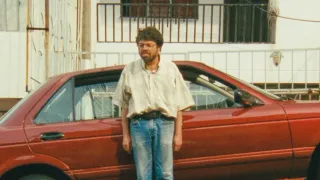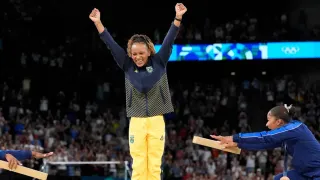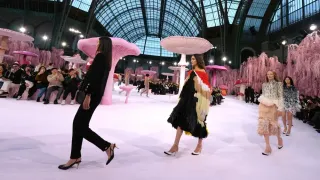February 23, 2017
Blake Morgan's Campaign for Musicians' Rights
Jim Gladstone READ TIME: 4 MIN.
"Spotify says they can't turn a profit because they have to pay artists too much. But the owner of Spotify is worth $310 million," says singer-songwriter James Morgan with a derisive laugh.
"I mean, let's be honest," says Morgan, who performs at The Lost Church on Saturday night. "If musicians know how to do anything, its how to count!"
Since 2013, when his heated e-mail exchange with Pandora CEO Tim Westergrin over performers' royalties was shared in the Huffington Post and went viral, Morgan has become at least as well known for his activism on behalf of other musicians as for his own recorded music.
But Morgan's subsequent founding of the #IRespectMusic campaign, public speaking at music industry events, and extensive lobbying of congress in support of the "Fair Play Fair Pay Act" and "Songwriters Equity Act" are natural outgrowths of a personal ethos that's been integral to Morgan's career since early on.
After graduating the Berklee School of Music and playing in a variety of bands, the Manhattan native signed a seven-album solo contract with legendary producer Phil Ramone's label at Sony Records. After releasing the well-reviewed 1997 "Anger's Candy" and touring as an opener for Joan Jett and Matchbox 20, Morgan grew leery of major label business practices and leveraged a loophole to exit his contract.
In the aftermath, he founded Engine Company Records, a label for his own output as well as artists he nurtures and produces (among them James McCartney and singer-songwriter Janita, who joins him for Saturday night's concert).
Since the beginning, a hallmark of the company's collegial and successful operations (Now the vertically integrated ECR Music group, it consists of multiple labels, along with a recording studio, publishing arm and other artist services) is that its artists own their master recordings.
Morgan's sense of artistic community and empowerment dates back to his own childhood. His parents �- Robin Morgan, the feminist writer and one-time Ms. Magazine editor, and gay activist Kenneth Pitchford - had an active social circle of artists and intellectuals who surrounded and inspired Morgan during his youth. Morgan's godmother was the late Lesley Gore, whose final album, "Ever Since," he produced.
While Morgan hasn't released a new album of his own reedy-voiced rock since 2013's "Diamonds In The Dark," he's played and produced on close to a dozen albums by ECR artists with whom he feels a close kinship. He's also had a weekly residency at Manhattan's Rockwood Music Hall which has sold out for a remarkable run of 14 months.
"I don't feel like I have to switch between activist mode and singer-songwriter mode and keep these things separate. My performance at Chico State [tomorrow night] is part of an artists' rights rally put together by the students there. And I did a lecture via Skype for students at Seattle University, and now they're planning on turning out for my show there.
"I'm lucky enough to have built an initial fan base back when I had that major label debut. But over the last couple years, I feel like my activism has really woken up my old fans and new people have been coming out as well. I've gotten attention for musicians' rights, so a lot of music makers come to my shows. I get approached after by so many people who are just happy to feel connected to a community of people who treat musicians with dignity and believe that being a musician can be a profession like any other. On my tax returns every year, I fill in 'musician' as my occupation, and nothing could make me prouder."
And yet, the larger music industry has aspects that are less respectable.
"The companies we talk about when we talk about music these days aren't music companies," Morgan explains. "It's a case of the new boss being worse than the old boss. At least the major record labels were in the music business. Pandora and Spotify don't make music and they've led musicians to an economic apocalypse."
Morgan points out that filmmakers and actors aren't angry at distribution systems in the way musicians are.
"That's because Netflix and Hulu and others are paying people to make new material. They're investing in the art and the artists."
"These [music] con men are offering the oldest con in the book: We shouldn't have to pay you because we'll get you exposure. These apocalypse drivers then tell us we're asking to move things backwards, not forwards; that we're anti-technology, anti-innovation. I don't know a single musician who doesn't like tech. Music is technology. A piano is a pretty incredible piece of technology. And American musicians don't need a lecture from technologists about innovation: Jazz, blues, hip-hop - that's American innovation at its best."
As furious as Morgan is about today's commercial music distribution networks, he is also saddened by the level of discussion about music among everyday listeners.
"Did the music move you? Did it make you smile, or get angry? Those are discussions people aren't having. Do you remember when Nirvana's 'Nevermind' came out? There was a huge shared experience, culturally. This music came out in the face of Poison and Motley Crue and everyone was like, 'What the hell's going on? The rules have changed.' "
Blake sees signs of change for musicians' rights, but also less conversation about the music itself.
"Everyone is caught up in the apparatus," he says. "Talking about how Chance the Rapper is only making 'Coloring Book' available for streaming, or how Adele refused to make her album available for streaming isn't talking about music. It's all non-artistic conversation. Its not about our shared experience. What people share now is pictures of their food."
James Morgan performs with Janita and The Singer and The Songwriter, on Saturday, February 25 at The Lost Church, 65 Capp Street. Tickets $10 in advance, $15 day of show. www.facebook.com/TheBlakeMorgan/ www.thelostchurch.com






